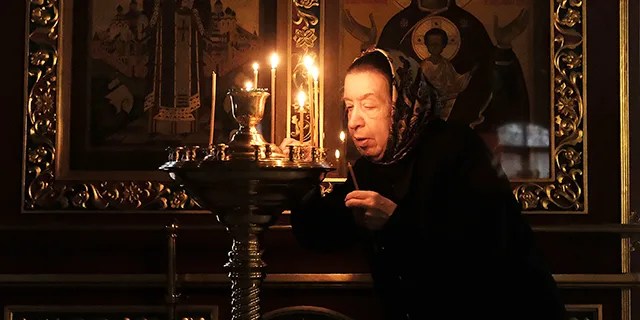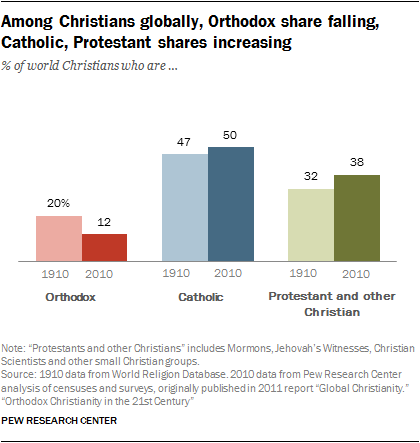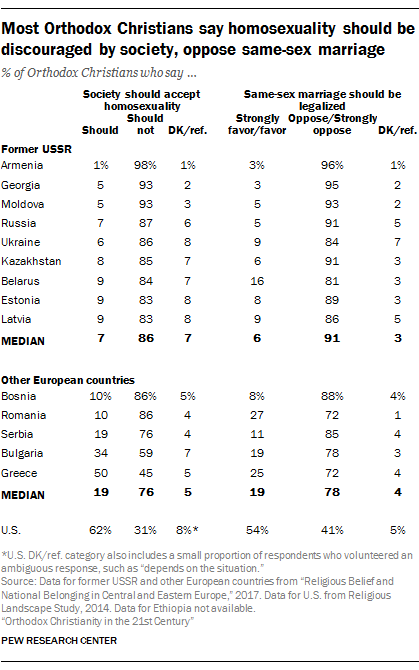
Orthodoxy is the third-largest branch of Christianity, after Catholicism and Protestantism. Today, there are approximately 260 million Orthodox Christians in the world, according to a new Pew Research Center report.
Orthodoxy, or Eastern Christianity, formally split from Roman Catholicism (known then as Western Christianity) in 1054 over a host of theological issues, high among them disputes over papal authority.
Here are key takeaways about Orthodox Christians, based on the report:

Orthodox Christians have decreased as a share of the overall Christian population even as their numbers have more than doubled since 1910, when there were 125 million of them. This decrease in share is due to the fact that the worldwide populations of Catholics, Protestants and other Christians have collectively almost quadrupled over the last century (from 490 million in 1910 to 1.9 billion in 2010). Roughly one-in-eight Christians (12%) are now Orthodox, down from one-in-five (20%) in 1910.

More than three-quarters (77%) of Orthodox Christians around the world live in Europe, although there is a considerable Orthodox population in Ethiopia (36 million). This is in marked contrast to the geographical distribution of Catholics and Protestants, just 24% and 12% of whom live in Europe, respectively. A majority of Catholics and Protestants now live in Latin America, sub-Saharan Africa or the Asia-Pacific region. In 1910, roughly half or more of Christians in all three traditions lived in Europe.
Most Orthodox Christians live in countries that were behind the Iron Curtain during the Soviet era and, by several standard measures, they exhibit relatively low levels of religiosity. This is especially true for Orthodox Christians living in former Soviet republics. In Russia, which has the world’s largest Orthodox population (101 million), just 6% of Orthodox Christians say they attend church at least once a week, 15% say religion is “very important” in their lives and 18% say they pray daily. Bucking this trend, again, is Ethiopia, where 78% of Orthodox Christians say they attend religious services at least weekly, 98% say religion is “very important” in their lives and 65% say they pray daily.
The vast majority of Orthodox Christians around the world say homosexuality should not be accepted by society. In nearly every country surveyed, with the exception of Greece and the United States, Orthodox majorities feel this way. These views are particularly strong among Orthodox populations in former Soviet republics. Orthodox majorities in the countries surveyed also oppose the legalization of same-sex marriage, although the U.S. is an exception to this pattern.


Few Orthodox Christians say they want to be reunited with the Roman Catholic Church. The view that Eastern Orthodoxy and Roman Catholicism should reconcile is a minority position in every Orthodox population surveyed across Central and Eastern Europe, except Romania. At the same time, many Orthodox Christians declined to answer this question, perhaps reflecting ambivalence about the topic. Catholics in the region are about as likely as Orthodox Christians to favor their two churches being in communion again (medians of 38% and 35%, respectively). Still, Orthodox and Catholic majorities in most countries surveyed say the two religious traditions have “a lot in common” with each other.
Orthodox Christians broadly support their church’s prohibition on women’s ordination to the priesthood. More Orthodox Christians favor this church stance than oppose it in most countries surveyed. For instance, in Ethiopia, 89% of Orthodox Christians support the prohibition on women’s ordination and just 7% oppose it. And in Romania, 74% of Orthodox Christians favor the church position and 22% oppose it. Orthodox women tend to be as likely as Orthodox men to be against the ordination of women.
Correction: The chart “Relatively low shares of Orthodox and Catholics favor Eastern Orthodoxy and Roman Catholicism being in communion” has been updated to correct the share of Catholics in Bosnia saying the two churches should be in communion.
